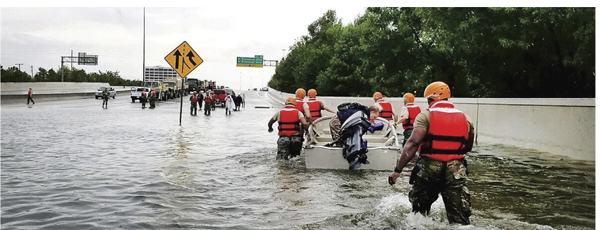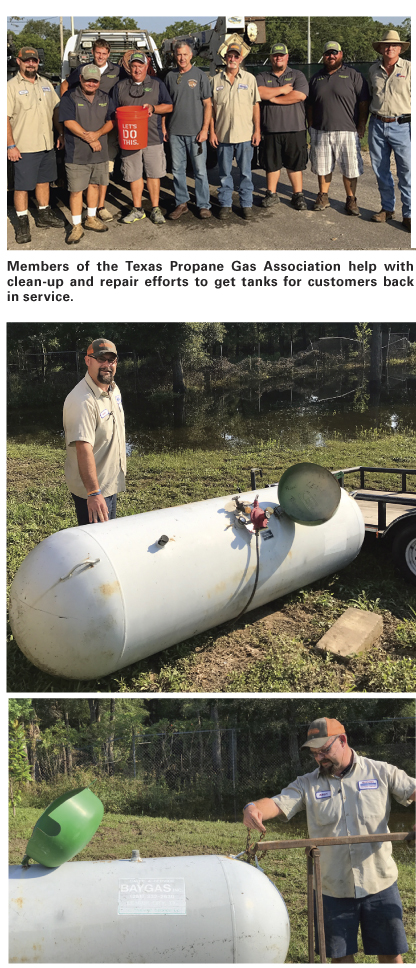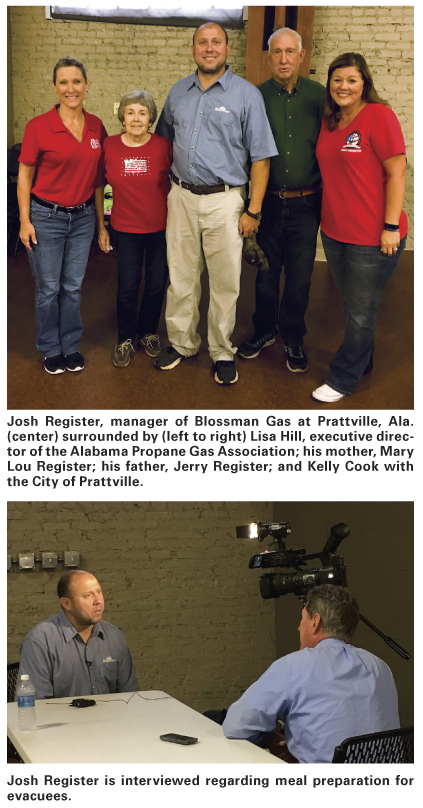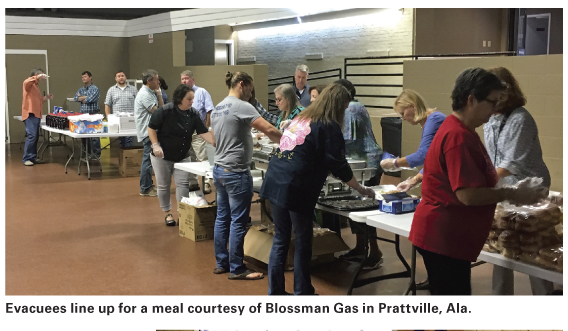Monday, October 9, 2017
Well before hurricanes Harvey, Irma, and Maria began causing their historic destruction in August and September 2017, the Propane Education & Research Council (PERC), National Propane Gas Association (NPGA), and many state propane associations began preparing for the worst. As the hurricanes made landfall, many more industry stakeholders played key roles both large and small to provide relief to fellow industry members, their customers, and others hit hard by the storms. 
The Texas Propane Gas Association (TPGA) had several members in the affected area. Bill Van Hoy, executive director, contacted 40 and found most companies said despite some challenges they were going to be OK. There were a few companies in definite need of help and Van Hoy mobilized volunteers from other companies in the state as well as a few willing to come to Texas from other states to lend a hand. “Initially the key goal was to get gas service back for customers. In many cases tanks needed to be inspected and reset. In some cases, due to extensive rebuilding required, getting propane service back was not going to be the top priority for a while,” Van Hoy said.
“We had some companies that literally had tornado damage as well as hurricane damage to their facilities, but they were still able to load and deliver gas to customers. It was amazing how the volunteers came together to help our companies do whatever it took to meet customer needs and get their business caught up,” he added.
A fund was established by the Texas association at Van Hoy’s direction to help offset the cost of repairing or replacing equipment at existing residential customers’ homes in counties affected by Hurricane Harvey. Jackie Mason, legislative and regulatory affairs director at the association, set the fund up online at www.gofundme.com/propanedisasterrelief and had raised $9900 by Sept. 20. Several donations came in immediately from state propane associations nationwide as well as some from industry companies and other individuals.
Mason is keeping association members up to date on hurricane relief activities in a weekly publication called Monday Morning Messenger, and links have been provided to documents that clarify hours-of-service waivers, regulatory exemptions for refined fuels providers (as many propane companies also sell refined fuels), and financial assistance information for small businesses.
In Florida, the landfall of Hurricane Irma brought similar challenges. “It kept us guessing as it corkscrewed up the state, hitting areas that meteorologists said would not be in the path while leaving other areas with less damage than expected,” said Dale Calhoun, executive director of the Florida Propane Gas Association. “This has been a rough couple of weeks but it has also been a story of propane people of all companies coming together and working together to resolve problems fast. It’s been a group effort.”
One key problem in Florida that was not a factor in Texas was lack of propane availability immediately after the storm. While Texas has ample storage and product in the salt caverns at the Mont Belvieu hub, Florida is a peninsula with limited storage. “The Plains terminal was not up yet, and a ship did not get into the Targa facility before the storm hit. It did get in Saturday after the storm,” Calhoun said. “We needed propane immediately for our customers, but many bulk plants were without electric power and we could not get gas out of them. Bringing propane down the peninsula in trucks to meet supply needs is not a fast process. With rail and ports down, we had seven days of only truck transports to move gas supply into Florida.
“The Governor helped us by requiring that restoring electricity to propane bulk plants be top priority while 6.7 million electricity accounts were without power,” Calhoun explained. “Then we had priorities where we needed propane fast to meet back-up generator needs, emergency response kitchens, and critical facilities across the state. We had to get hours-of-service waivers and provided a lot of information fast to our members as they dealt with the challenges brought by Irma.”
Gregg Walker, director of communications at PERC, said it’s a standard procedure for the council to monitor potentially destructive weather situations and provide alerts and informational materials to state associations and consumers. Because much of the guidance was prepared years ago, PERC had it in the hands of association leaders and companies ahead of the storms. “We spoke with a number of marketers in affected areas who told us they needed reinforcement on basic safety messages,” Walker said. Written materials and a video featuring PERC president and CEO Tucker Perkins stressed important safety measures to take in preparing for, during, and in the aftermath of a major hurricane.
Key messages included urging consumers to not turn on appliances that may have been under water, but to instead have a certified technician evaluate them first; reminding consumers not to bring outdoor appliances inside such as grills and patio heaters; telling consumers never to store propane cylinders inside; and emphasizing the dangers of using a range-top stove for space heating.
Walker pointed out that propane itself played a major role in relief efforts for residents displaced by the hurricanes, regardless of whether they were propane customers. “We monitored numerous stories of propane being used in hurricane relief efforts. In cases, widespread power outages put propane-powered back-up generators to use, propane grills were used to cook for thousands of displaced residents through the efforts of Operation BBQ Relief (see related story on p. 25) and others, and propane autogas was part of many recovery efforts as well. “The portability of propane made it an asset in relief efforts. We worked closely with NPGA and the state associations to keep information going out. NPGA created a nice Web page with a lot of resources regarding the hurricanes. We have been very pleased with the cooperation on this effort.”
“Propane marketers have a unique set of challenges during hurricanes: prepare their customers, prepare their businesses, and prepare their own homes,” said Mollie O’Dell, vice president of communications at NPGA. “Through two event-specific websites, npga.org/HurricaneHarvey and npga.org/HurricaneIrma, marketers were able to find customer-focused resources from PERC and the latest information on government relief efforts and resources from NPGA. The websites remain up to date, and we hope marketers will utilize them to find stories about how propane continues to serve the communities recovering from Hurricane Harvey and Hurricane Irma.”
Between the two storm paths, Alabama did not have any issues with the storm. We did have evacuees in our area, said Lisa Hill, executive director of the Alabama Propane Gas Association (APGA). “Josh Register, manager for Blossman Gas in Prattville, came up with a great idea on how to help evacuees during Irma. Using APGA’s propane grill, Josh cooked 40 Boston butts and organized donations from several vendors to provide meals to evacuees and city workers in the Prattville/Montgomery area. It’s great to have caring people in our industry. I’m really proud of Josh’s efforts,” Hill said.

Ray Energy Corp., a midstream wholesale propane company based in Troy, N.Y., is offering $100 to Hurricane Relief for every spot transport load delivered to customers during October up to $10,000. Donations will be split between the Houston Food Bank and Americares.
In the aftermath of the hurricanes, AmeriGas launched the AmeriGas Airborne Division, a group of volunteers within the company who mobilized to assist other locations serve customers and deliver propane to where it was needed most. The Airborne Division team members were deployed to other districts requesting help when a backlog occurred. The team stayed on location until the backlog disappeared and the local office stabilized and returned to normal. The 55 members of the division spent several weeks in South Texas following Hurricane Harvey.
There have also been some unique ways industry members have helped others. Mark Grave of Jetmark LLC had a phone call for assistance on operating the company’s Ventur-Evac tool to evacuate propane from a 30,000-gal. tank with no power. “This is not what the product is typically used for,” Grave said. “Nonetheless, I was able to talk Bobby Fisher of Tarantin and the customer through the process so they could have quick access to propane.”
Companies that provide generators have been very busy. Generac said it had three teams of technicians traveling in vans with parts and service equipment to help victims of hurricanes Harvey and Irma. According to Art Aiello, a spokesman for the company, support teams have been working from Home Depot parking lots in Irma-stricken areas, offering assistance to anyone with a generator issue regardless of the unit’s brand.
Briggs and Stratton crews have been working around the clock to move as much inventory as close to the disaster zones as possible. “We’re no stranger to these types of events,” said Laura Timms, vice president of corporate communications for the company.
Wacker Neuson of Menomonee Falls, Wis. has sent truckloads of submersible pumps and generators to some of its largest customers in Texas, as well as to equipment rental companies, according to spokeswoman Julie Schuster. The company’s largest water pumps can move more than 1300 gallons of water and debris a minute.
In getting energy infrastructure — refineries, storage facilities, terminals, retail sites, and customer locations — back up and running in the Gulf, the energy sector faced as many challenges as any other. Portable propane certainly played a key role, not only in restoring regular service but in quickly providing critically needed temporary cooking fuel for those displaced, and many more benefits as well. “It has been a rough time,” said Calhoun. “But we’ve learned a lot about responding to an emergency of this magnitude; we’ll be even more prepared for next time — and this is Florida. There will be a next time, just hopefully not at the same scale.” —Pat Thornton

The Texas Propane Gas Association (TPGA) had several members in the affected area. Bill Van Hoy, executive director, contacted 40 and found most companies said despite some challenges they were going to be OK. There were a few companies in definite need of help and Van Hoy mobilized volunteers from other companies in the state as well as a few willing to come to Texas from other states to lend a hand. “Initially the key goal was to get gas service back for customers. In many cases tanks needed to be inspected and reset. In some cases, due to extensive rebuilding required, getting propane service back was not going to be the top priority for a while,” Van Hoy said.
“We had some companies that literally had tornado damage as well as hurricane damage to their facilities, but they were still able to load and deliver gas to customers. It was amazing how the volunteers came together to help our companies do whatever it took to meet customer needs and get their business caught up,” he added.
A fund was established by the Texas association at Van Hoy’s direction to help offset the cost of repairing or replacing equipment at existing residential customers’ homes in counties affected by Hurricane Harvey. Jackie Mason, legislative and regulatory affairs director at the association, set the fund up online at www.gofundme.com/propanedisasterrelief and had raised $9900 by Sept. 20. Several donations came in immediately from state propane associations nationwide as well as some from industry companies and other individuals.

Mason is keeping association members up to date on hurricane relief activities in a weekly publication called Monday Morning Messenger, and links have been provided to documents that clarify hours-of-service waivers, regulatory exemptions for refined fuels providers (as many propane companies also sell refined fuels), and financial assistance information for small businesses.
In Florida, the landfall of Hurricane Irma brought similar challenges. “It kept us guessing as it corkscrewed up the state, hitting areas that meteorologists said would not be in the path while leaving other areas with less damage than expected,” said Dale Calhoun, executive director of the Florida Propane Gas Association. “This has been a rough couple of weeks but it has also been a story of propane people of all companies coming together and working together to resolve problems fast. It’s been a group effort.”
One key problem in Florida that was not a factor in Texas was lack of propane availability immediately after the storm. While Texas has ample storage and product in the salt caverns at the Mont Belvieu hub, Florida is a peninsula with limited storage. “The Plains terminal was not up yet, and a ship did not get into the Targa facility before the storm hit. It did get in Saturday after the storm,” Calhoun said. “We needed propane immediately for our customers, but many bulk plants were without electric power and we could not get gas out of them. Bringing propane down the peninsula in trucks to meet supply needs is not a fast process. With rail and ports down, we had seven days of only truck transports to move gas supply into Florida.
“The Governor helped us by requiring that restoring electricity to propane bulk plants be top priority while 6.7 million electricity accounts were without power,” Calhoun explained. “Then we had priorities where we needed propane fast to meet back-up generator needs, emergency response kitchens, and critical facilities across the state. We had to get hours-of-service waivers and provided a lot of information fast to our members as they dealt with the challenges brought by Irma.”
Gregg Walker, director of communications at PERC, said it’s a standard procedure for the council to monitor potentially destructive weather situations and provide alerts and informational materials to state associations and consumers. Because much of the guidance was prepared years ago, PERC had it in the hands of association leaders and companies ahead of the storms. “We spoke with a number of marketers in affected areas who told us they needed reinforcement on basic safety messages,” Walker said. Written materials and a video featuring PERC president and CEO Tucker Perkins stressed important safety measures to take in preparing for, during, and in the aftermath of a major hurricane.
Key messages included urging consumers to not turn on appliances that may have been under water, but to instead have a certified technician evaluate them first; reminding consumers not to bring outdoor appliances inside such as grills and patio heaters; telling consumers never to store propane cylinders inside; and emphasizing the dangers of using a range-top stove for space heating.
Walker pointed out that propane itself played a major role in relief efforts for residents displaced by the hurricanes, regardless of whether they were propane customers. “We monitored numerous stories of propane being used in hurricane relief efforts. In cases, widespread power outages put propane-powered back-up generators to use, propane grills were used to cook for thousands of displaced residents through the efforts of Operation BBQ Relief (see related story on p. 25) and others, and propane autogas was part of many recovery efforts as well. “The portability of propane made it an asset in relief efforts. We worked closely with NPGA and the state associations to keep information going out. NPGA created a nice Web page with a lot of resources regarding the hurricanes. We have been very pleased with the cooperation on this effort.”
“Propane marketers have a unique set of challenges during hurricanes: prepare their customers, prepare their businesses, and prepare their own homes,” said Mollie O’Dell, vice president of communications at NPGA. “Through two event-specific websites, npga.org/HurricaneHarvey and npga.org/HurricaneIrma, marketers were able to find customer-focused resources from PERC and the latest information on government relief efforts and resources from NPGA. The websites remain up to date, and we hope marketers will utilize them to find stories about how propane continues to serve the communities recovering from Hurricane Harvey and Hurricane Irma.”

Between the two storm paths, Alabama did not have any issues with the storm. We did have evacuees in our area, said Lisa Hill, executive director of the Alabama Propane Gas Association (APGA). “Josh Register, manager for Blossman Gas in Prattville, came up with a great idea on how to help evacuees during Irma. Using APGA’s propane grill, Josh cooked 40 Boston butts and organized donations from several vendors to provide meals to evacuees and city workers in the Prattville/Montgomery area. It’s great to have caring people in our industry. I’m really proud of Josh’s efforts,” Hill said.

Ray Energy Corp., a midstream wholesale propane company based in Troy, N.Y., is offering $100 to Hurricane Relief for every spot transport load delivered to customers during October up to $10,000. Donations will be split between the Houston Food Bank and Americares.
In the aftermath of the hurricanes, AmeriGas launched the AmeriGas Airborne Division, a group of volunteers within the company who mobilized to assist other locations serve customers and deliver propane to where it was needed most. The Airborne Division team members were deployed to other districts requesting help when a backlog occurred. The team stayed on location until the backlog disappeared and the local office stabilized and returned to normal. The 55 members of the division spent several weeks in South Texas following Hurricane Harvey.
There have also been some unique ways industry members have helped others. Mark Grave of Jetmark LLC had a phone call for assistance on operating the company’s Ventur-Evac tool to evacuate propane from a 30,000-gal. tank with no power. “This is not what the product is typically used for,” Grave said. “Nonetheless, I was able to talk Bobby Fisher of Tarantin and the customer through the process so they could have quick access to propane.”
Companies that provide generators have been very busy. Generac said it had three teams of technicians traveling in vans with parts and service equipment to help victims of hurricanes Harvey and Irma. According to Art Aiello, a spokesman for the company, support teams have been working from Home Depot parking lots in Irma-stricken areas, offering assistance to anyone with a generator issue regardless of the unit’s brand.
Briggs and Stratton crews have been working around the clock to move as much inventory as close to the disaster zones as possible. “We’re no stranger to these types of events,” said Laura Timms, vice president of corporate communications for the company.
Wacker Neuson of Menomonee Falls, Wis. has sent truckloads of submersible pumps and generators to some of its largest customers in Texas, as well as to equipment rental companies, according to spokeswoman Julie Schuster. The company’s largest water pumps can move more than 1300 gallons of water and debris a minute.
In getting energy infrastructure — refineries, storage facilities, terminals, retail sites, and customer locations — back up and running in the Gulf, the energy sector faced as many challenges as any other. Portable propane certainly played a key role, not only in restoring regular service but in quickly providing critically needed temporary cooking fuel for those displaced, and many more benefits as well. “It has been a rough time,” said Calhoun. “But we’ve learned a lot about responding to an emergency of this magnitude; we’ll be even more prepared for next time — and this is Florida. There will be a next time, just hopefully not at the same scale.” —Pat Thornton

